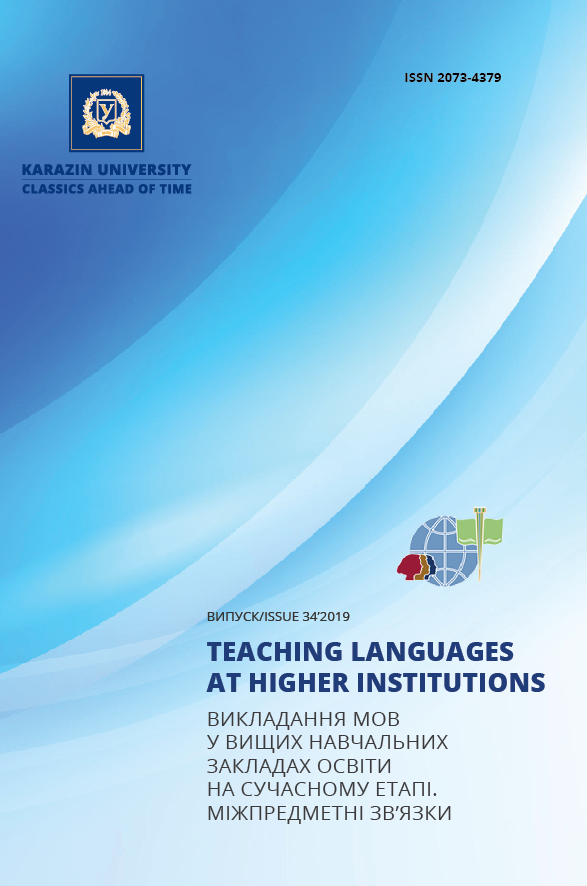Discussion potential of the essay genre in teaching Ukrainian as a foreign language
Abstract
The article deals with the problem of academic discussion’ opportunities in teaching Ukrainian as a foreign language. The author emphasizes the subjective interpretation of the topic as the essential characteristic, the main genre law of the essay. Bright subjectivity encourages the reader to meditate and dialogue with the text.
We can offer an essay for discussion to foreigners speaks Ukrainian at medium and high levels. This will be especially useful for foreign students of the humanities. Examples of essay prose are relevant to future Ukrainian philologist, historians, political scientists, sociologists, cultural scientists, and art historians, as the essay thematic spectrum is concentrated in these areas. In addition, reading essays and their discussion will promote the development of textual competence – the main component of the humanitarian’s professional competence.
Among the various forms of modern essay, an essay in the form of a column in the media is a most interesting in the aspect of language learning. Small size, an appeal to important contemporary themes, and the involvement of elements of the colloquial style – these basic features determine the linguodidactic potential of an essay-column.
The article proposes a detailed analysis of the essay “One against All” by S. Zadan and shows its internal contradiction. Synonymic rows make one global antithesis: a compromise and a struggle. The analysis reveals how ambiguous the problem is, how subjective the authorʼs point of view is and how productive it is for organizing discussion. The author's questions give rise to student answers and a lot of new questions.
The article proposes the plan of the discussion and emphasizes the importance of the psychological factors and the personal teacher’s traits (the ability to feel the interests of the group, to create a positive psychological microclimate, to interest students, to call for a trusting conversation).
Prospects for further research are the selection and linguodidactic analysis of Ukrainian essays suitable for use in the study of foreigners.
Downloads
References
Balaklyczkyj, M.A. (2007). Ese yak khudozhno-publicystychnyj zhanr [Essay as an artistic and journalistic genre]. Kharkiv: V.N. Karazin Kharkiv National University, pp. 95–96 [in Ukrainian].
Matiyash, B. (2005). Shhos nakshtalt eseyistyky [Something like essay prose]. In: Krytyka [Critics] [online]. 5 (91). Available at: https://krytyka.com/ua/articles/shchos-na-kshtalt-eseyistyky [Accessed Mach 10, 2019] [in Ukrainian].
Shebelist, S.V. (2009). Osoblyvosti rozvytku suchasnoyi ukrayinskoyi eseyistyky v systemi zhurnalistskyx zhanriv [The development of contemporary Ukrainian essay in the system of journalistic genres]. Extended abstract of candidate’s thesis. Kyiv: Taras Shevchenko Kyiv National University [in Ukrainian].
Shebelist, S. (2013). Ryabchuk M.: Esej mozhe buty pro shho zavgodno, ne maye ly`sh prava buty nudnym i banalny`m [Ryabchuk M.: Essay can be about anything, but it just donot have to be boring and banal]. In: Zaxid.net. [online]. Available at: //zaxid.net/ryabchuk_esey_mozhe_ buti_pro_shho_zavgodno_ne_maye_lish_prava_buti_nudnim_i_banalnim_n1296260 [Accessed March 10, 2019] [in Ukrainian].
Shherbakova, I. and Plotkina, E. (1974). Jesse. Nekotorye voprosy zhanra [Essay. Some questions of the genre]. Problemy stilja i zhanra v sovetskoj literature [Problems of style and genre in Soviet literature]. Sverdlovsk: Sverdlovsk State University, pp. 102–123 [in Russian].
Shvecz, G.D. (2018). Vykorystannya tekstiv suchasnoyi eseyistyky v navchanni ukrayinskoyi movy inozemnykh studentiv gumanitarnykh specialnostej [Modern essays in the teaching Ukrainian as foreign language (for students of humanities)]. Studia Wschodniosłowiańskie [East Slavonic Studies]. Bialystok: University of Bialystok, 18, pp. 261–285 [in Ukrainian].
Shvecz, G.D. (2006). Eseyistyka Vasylya Barky: zhanrova specyfika ta problematyka [The Vasil Barka’s essay prose: the genre specific and problems]. Extended abstract of candidate’s thesis. Kyiv: Taras Shevchenko Kyiv National University [in Ukrainian].
Shvecz, G.D. (2017). Ese yak vyd roboty z rozvytku navychok pysmovogo movlennya inozemnykh studentiv-gumanitariyiv [Essay as a kind of work on the development of writing skills for foreign students of humanities]. In: Respublikanskija Kupalawskija chytanni [Republican Kupalovsky reading]. Grodna: JurSaPryntpp, pp. 315–319 [in Ukrainian].
Shvecz, G.D. (2016) Tekstova osnova navchannya ukrayinskoyi movy inozemnykh studentiv-gumanitariyiv [Text-based teaching Ukrainian to foreign students of the humanities]. In: Pedagogichnyj almanakh [Pedagogical almanac]. Kherson: Kherson Academy of Continuous Education, 30, pp. 55–61 [in Ukrainian].
Toptygina, N.M. (2004). Navchannya dyskusiyi na materiali khudozhnikh tekstiv u procesi vyvchennya anglijskoyi yak drugoyi inozemnoyi movy [Teaching the discussion on the material of artistic texts in the process of studying English as a second foreign language]. Сandidate’s thesis. Kyiv: Kyiv National Linguistic University [in Ukrainian].
Zhadan, S. (2015). Odynproty vsikh [One against all]. Zhadan, S. and Bodnar, M. Koly spade speka. Brykolazh [When the heat goes down. Bricolage]. Ivano-Frankivsk: Lileya – NV, pp. 95–96 [in Ukrainian].
Zozulya, I., Prysyazhna, O. and Solodar, L. (2014). Osnovni suchasni metody vykladannya ukrayinskoyi movy yak inozemnoyi (dosvid vykladachiv kafedry movoznavstva Vinnyczkogo nacionalnogo tekhnichnogo universytetu) [The main current methods of teaching Ukrainian as a foreign language (eхperience of lectures of the faculty of linguistics of Vinnytskyy National Technical University)]. Teoriya i praktyka vykladannya ukrayinskoyi movy yak inozemnoyi [Theory and practice of teaching Ukrainian as a foreign language]. Lviv: I. Franko Lviv National University, 9, pp. 22–27 [in Ukrainian].
Zykova, E. (1980). “Opyty” Mishelja Montenja i problema zarozhdenija zhanra jesse [“Essays” by Michel Montaigne and the problem of the origin of the essay genre]. Filologicheskie nauki [Philology studies], 4, pp. 14–22 [in Russian].

